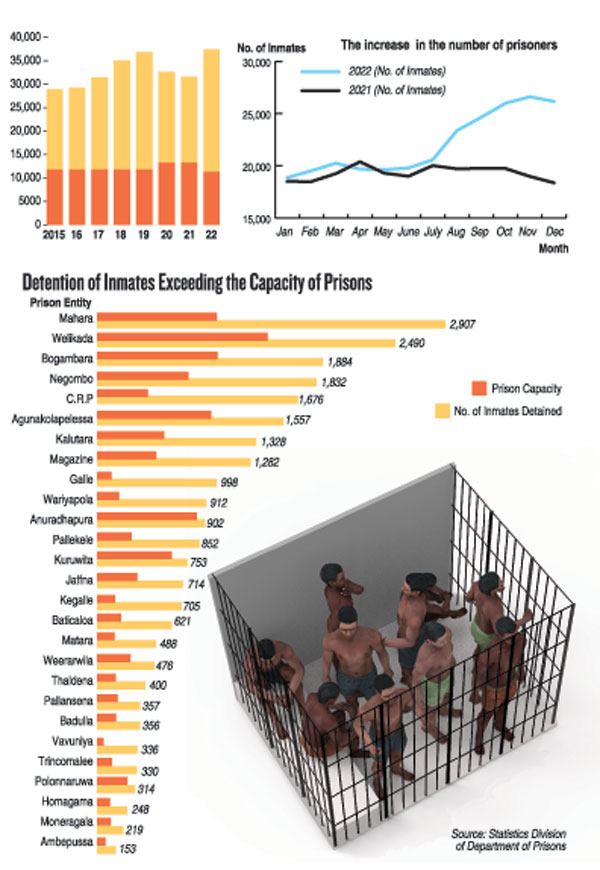News
Prisons swell amid law reforms and Yukthiya; activists raise concerns over rights
View(s):By Minaza Hassan
Sri Lanka’s prison cells that are already bursting at the seams are experiencing a new surge in prison population, with justice minister attributing it to the recent amendments to the Dangerous Drugs Ordinance Act, while others point to the ongoing Yukthiya anti-narcotic operations and many underlying causes.
Sri Lanka’s prisons have been beset by the congestion crisis, as more than thirty thousand prisoners are held in cells meant for about 11,000, indicating a 300 percent overcrowding.
According to Prison Department Spokesman Gamini Dissanayake, remand prisons, especially the Welikada remand prison, have the highest rate of overcrowding. Justice Minister Wijeyadasa Rajapaksa said one of the major contributory causes of the recent escalation in the prison population was the amendment to the Dangerous Drugs Ordinance Act of October 2022. The amendment added more harmful substances to the prohibited list, and this, naturally, prompted more arrests, he said.
When asked about the overcrowding at the Welikada prison, the minister said the complex housed both remand and convicted prisoners, and this was why it had the highest number of prisoners.
Mr. Rajapaksa said that as an immediate solution to the crisis, a decision had been taken to acquire unused lands and buildings in Welissara and Batticaloa.
“There are certain injustices in the legal system. Some people have been in remand for a long period of time. According to the existing law, when such a person is convicted, his sentence will begin on the date his conviction is affirmed.

“Due to this reason, if a sentence of ten years is given, he may have served an additional five years on remand,” he said, adding that amendments would be presented to Parliament in the coming weeks to rectify this injustice.
However, amidst the issue of overcrowding, activists and prison rights groups have also often been vocal about the poor prison conditions and prisoner treatment in Sri Lanka.
“People are arrested and taken into custody based on previous evidence without a doctor’s report,” said Senaka Perera, chairman of the Committee for Protecting Rights of Prisoners (CPRP), commenting on the ongoing Yukthiya anti-narcotics operation.
If there is corruption in law enforcement, and if the police who are supposed to implement the law do not follow it, how can others follow it? asked Mr. Perera, highlighting that the law is not applied fairly within the justice system.
In certain instances, when bail is granted by courts, the prison department fails to implement the court order, violating individuals’ rights and contributing to prison congestion, he said.
Complaints have been made in such instances to the Human Rights Commission as well, he added.
In Sri Lankan prisons, it is common that a cell meant to accommodate one person is shared by many people due to inadequate space and overcrowding.
Former Presidential Secretary and Prisoners’ Welfare Association President Austin Fernando said sleep deprivation, among many other issues in overcrowded cells, had subjected prisoners to inhumane conditions.
“These prisons do not have sufficient accommodations to provide basic needs such as toilet facilities, food, sleep, and space,” he added. Mr. Fernando said the authorities should have taken into account the prison space crisis before they launched crime-busting initiatives.
Outlining measures that could be taken to alleviate the current prison conditions, he said non-governmental organisations and prison rights groups have funded job fares for prisoners, and we have seen good results.
However, the treatment of prisoners in Sri Lanka was an integrated problem, and it called for an integrated solution, Mr. Fernando said.
Some of the reasons for overcrowding in prisons can also be the high crime rate, the economy’s downfall, poverty, a lack of education, the environment, circumstances, and delays in remand cases. “The justice system, law enforcement, and the government have a part to play in addressing these issues,” he said.
Criminologist and lawyer Shevindri Manuel, who is also the Programme Manager at iProbono, a social justice organisation, blamed the lack of a proper rehabilitation mechanism for the crisis. “There are reports of people getting arrested, but what happens to them after that? What kind of support system do the law enforcement authorities, the prison authorities, and the health authorities provide to these addicts?” she asked.
“We need to look at addiction as a medical issue rather than a law enforcement issue,” she said.
“We are using a law enforcement and punitive approach to drug use rather than focusing on harm reduction, considering the user-health perspective, and reducing the number of users in the country,” Ms. Manuel said.
If someone is arrested for a drug offence, once they come out, they are still going to be an addict because there is so much drug use even within prisons, she said.
“We have seen that arresting people and putting them into prisons is ineffective, and it has only helped increase the number of prisoners, contributing to prison congestion and making the conditions in Sri Lankan prisons worse,” Ms. Manuel said, adding, “Prisoners or not, we are all citizens of this country; how can the government support them to reintegrate back into society?”
The activist said the authorities must focus on certain measures like using methadone treatment, which involves the use of drugs that don’t have a psychoactive component to them, incorporating prison literacy programmes, and providing support with reintegration.
She noted that people who fall into a habit of drug use usually do it to escape their reality due to poverty or trauma.
The best way to say that you found the home of your dreams is by finding it on Hitad.lk. We have listings for apartments for sale or rent in Sri Lanka, no matter what locale you're looking for! Whether you live in Colombo, Galle, Kandy, Matara, Jaffna and more - we've got them all!

